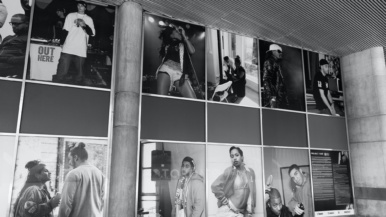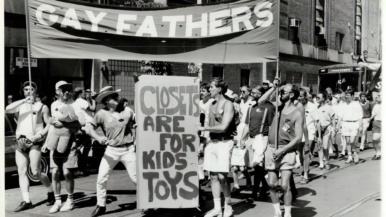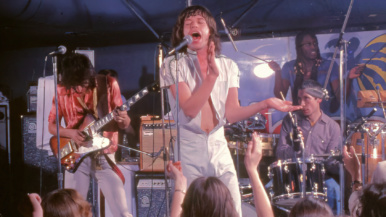A look inside U of T’s massive archive of Leonard Cohen poems, letters and pictures

The world is still reeling from the death of Leonard Cohen, the latest loss in a year that also claimed David Bowie, Prince and Muhammad Ali. Grieving fans can find solace at the University of Toronto’s Thomas Fisher Rare Book Library, home to 140 banker’s boxes worth of Cohen’s archives. Throughout his career, Cohen donated scores of remnants to the library: handwritten notes and letters, portraits, CDs, paintings, novel manuscripts, books, early drafts of his poetry and lyrics, and even art he made when he lived as a Buddhist monk. Jennifer Toews, Fisher’s modern manuscripts librarian, keeps watch over the collection. “His passing makes this material all that more important,” she says. “He’s a big part of us—and a lovely person.” Here, the stories behind 13 pieces of Cohen memorabilia.

These notebooks came with the the manuscripts of Cohen’s second novel, Beautiful Losers, and first book of poetry book, Let Us Compare Mythologies, which Fisher bought in the early ’60s. (Apparently, Cohen lived off money from the sale for a year on the Greek island of Hydra—he would have been about 26, and rent was about $14 a month.) The books contain drafts of his poetry and lyrics, as well as relics of daily life: there’s a sketch of a rabbit named Cocoa, diary entries (“Where shall I go now?) and phone numbers. Cohen even scribbled a few words of a poem (“This cigarette…It’s clear to me that you will have to deceive me…”) on a piece of toilet paper, pictured in the upper right hand corner. “I love the intimacy of these notebooks and the way they bring us into his life and thoughts at that specific time and place, which was a very important one for him,” Toews says:

U of T archivist Richard Landon and his wife, Massey College librarian Marie Korey, visited Los Angeles in 2005 and packed up 99 boxes’ worth of Cohen’s donated materials to ship back to Toronto. There were countless drafts of Cohen’s lyrics, including “Hallelujah,” “So Long, Marianne” and many more:

Cohen dabbled in playwriting in the 1960s, when he completed a 35-page script for Shoestring Theatre called The New Step, a “Ballet Drama in One Act.” The production was telecast on CBC in Montreal on May 31, 1964, and Cohen included it in his third collection of poetry, Flowers for Hitler, that same year. The notes include a few musical cues, a list of percussion instruments and bit of long division:

Cohen tried to respond to every piece of fan mail personally, but couldn’t keep up. “His fan mail is extensive, encompassing every possible type of person,” Toews says. “I always found it interesting to discover who his fans were. For example, the archivist for Nelson Mandela was visiting Toronto and came to see the Leonard Cohen papers—turns out he is a big fan.” One correspondence in the collection is between Cohen and a five-year-old girl who had heard his music in gymnastics class—she ends the letter with her age, so when Cohen wrote back, he did the same. Other admirers sent their own work—lyrics, poetry, prose—hoping he would read it:

Fans also sent Cohen other people’s work that they thought he’d find meaningful. For example, in 1993, Cohen visited Winnipeg’s Habitat for Humanity Jimmy Carter work camp, where 1,000 volunteers were helping to build 18 homes in a week. At his concert the next day, a local hung out with Cohen backstage; he later sent Cohen this book, Building on Common Ground, which was published after the build, and a letter detailing how Cohen’s thoughtful lyrics had “soothed and spoken to” his soul:

Fans also sent Cohen their paintings. This 2005 acrylic on board is called Catharsis #1:

Other fans opted to mail Cohen stranger offerings, like seeds and leaves:

Photographers often sent Cohen their shots of him. This is a mid-1990s portrait of Cohen by Toronto photographer Rino Noto (likely in his Dupont studio)—and, yes, he is wearing wings:

In February 2009, Cohen was inducted into the Canadian Songwriters Hall of Fame. After the ceremony, he promptly had the concierge at King Edward Hotel, where he was staying, call the reference desk at the Fisher library to ask them to send a staff member to pick up the heavy award. “He didn’t want to bring it on the plane,” Toews says. “And he always had us in mind”:

In 2006, Indigo CEO Heather Reisman gave Cohen a book of letters that she’d invited Canadians to write to him. One touching letter is from a fan whose dying husband asked that she play “Alexandra Leaving” at his memorial service. Another is from troubadour Ron Sexsmith in 2006, where he thanks Cohen for helping him choose the life of a songwriter over the life of a rock star:

Another letter came from a former chairman of Citigroup Global Markets Canada. When Cohen was president of McGill’s Zeta Beta Tau chapter, he oversaw the man’s initiation at a coffee house on Pine Avenue in Montreal. Cohen handed the man a guitar and invited him to sing while standing on a table. To this day, the man doesn’t know how to play guitar, but Cohen is the reason he occasionally sings “I Ride an Old Point” in the shower:

One fan tattooed Cohen’s face on her arm and sent him a photo. In a letter, she recalls how she waited for him by the back door of Vancouver’s Orpheum Theatre after he played a concert there in 1993. When he appeared, he kissed her on the cheek and whispered in her ear, “I’d love to talk to you for a thousand hours”:

In 1961, John B. Oakes took over the New York Times’ editorial page and invited Cohen to submit a poem for publication. Cohen obliged, only to receive the following rejection: “We have stayed with your poem ‘On His Twenty-Seventh Birthday’ for quite a while. I am afraid however it is not precisely for us—a fact we regret. Thank you for letting us see it.” If only rejection letters today were so polite:






